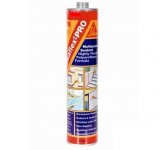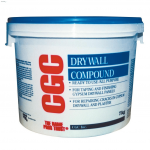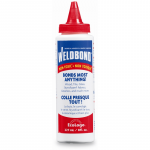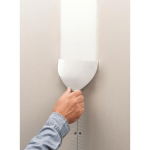Hi All.
I came across a vlogger who described design aspects of his Voight Tube Speakers & demonstrated the science behind his final design.
I'm drawn to this design as it does away with the cost and complexity of crossovers, & the cabinets are straight forward to cut and build.
The design features 8" full range drivers, and combines transmission line design by using tall tapered cabinets and with porting with a horn shaped mouth for the horn effect.
Tuning is performed by packing long fibre material in the top section of the tapering cabinets.
One of the key parts of his design was the cabinet material choice and the way he dealt with dampening issues.
He chose 3/4" plywood, and dealt with stiffness & resonance by gluing sheets of MDF internally using a compound called Decicamp dc30.
The polyurethane damping paste resulted in acceptable levels of deadening the walls of the cabinets.
The paste is northward of USD$150.
Is there a better/less expensive way of dealing with resonance issues?
I came across a vlogger who described design aspects of his Voight Tube Speakers & demonstrated the science behind his final design.
I'm drawn to this design as it does away with the cost and complexity of crossovers, & the cabinets are straight forward to cut and build.
The design features 8" full range drivers, and combines transmission line design by using tall tapered cabinets and with porting with a horn shaped mouth for the horn effect.
Tuning is performed by packing long fibre material in the top section of the tapering cabinets.
One of the key parts of his design was the cabinet material choice and the way he dealt with dampening issues.
He chose 3/4" plywood, and dealt with stiffness & resonance by gluing sheets of MDF internally using a compound called Decicamp dc30.
The polyurethane damping paste resulted in acceptable levels of deadening the walls of the cabinets.
The paste is northward of USD$150.
Is there a better/less expensive way of dealing with resonance issues?
Last edited:
Thanks.Use a more common polyurethane adhesive. Eg this, or even something similar that doesn't set as soft will do well.
Why would the designer go to the expense of using an expensive product when a cheap polyurethane would do the job?
He was able to demonstrate resonance using an oscilloscope.
He indicated the poly layer needed to be thin (1mm or 2mm) for it to work.
Has anyone tested the common polyurethane adhesive?
North Creek Music Systems "Glop"
http://radio-weblogs.com/0101702/categories/myHobbies/JordanSpeakers.html
"I followed North Creek's suggestion to "glop" the sides of the cabinet. Glop is a 50/50 mixture of their soft glue and drywall compound; Short claims that this helps dampen the cabinets above 300 Hz (seen here on the outside walls of the cabinets as a 1/8 to 1/4" thick
layer)."
( I've used white Weld Bond glue & drywall compound)
post # 17
https://www.diyaudio.com/community/threads/north-creek-rhythm-manuals-sought.343591/
https://www.diyaudio.com/community/attachments/cabinet-handbook-pdf.787055/
http://radio-weblogs.com/0101702/categories/myHobbies/JordanSpeakers.html
"I followed North Creek's suggestion to "glop" the sides of the cabinet. Glop is a 50/50 mixture of their soft glue and drywall compound; Short claims that this helps dampen the cabinets above 300 Hz (seen here on the outside walls of the cabinets as a 1/8 to 1/4" thick
layer)."
( I've used white Weld Bond glue & drywall compound)
post # 17
https://www.diyaudio.com/community/threads/north-creek-rhythm-manuals-sought.343591/
https://www.diyaudio.com/community/attachments/cabinet-handbook-pdf.787055/
Thanks Chris.
Very interesting resource.
It might be the terminology used on different continents, but what specific compound is drywall compound?
Very interesting resource.
It might be the terminology used on different continents, but what specific compound is drywall compound?
Last edited by a moderator:
Good question. I'd guess they're talking about the stud adhesive, not the jointing compound or cornice adhesive.
i have a tub of it.
I might experiment by gluing a sheet of 3/4" ply with mdf and then tapping it to listen for resonance.
I might experiment by gluing a sheet of 3/4" ply with mdf and then tapping it to listen for resonance.
Last edited by a moderator:
Do that. I like to drop a hammer onto it from a short distance because it seems to give roughly a broadband impulse.
I notice stud adhesive gets kind of hard after a while. Just for reference I might add that it has been said that Liquid Nails for Floors makes a reasonable generic compound because it doesn't get hard.
I notice stud adhesive gets kind of hard after a while. Just for reference I might add that it has been said that Liquid Nails for Floors makes a reasonable generic compound because it doesn't get hard.
https://www.thespruce.com/what-is-drywall-made-of-1821482what specific compound is drywall compound?
If it's a "non cornice adhesive" plaster powder, this comes in a number of types with differing properties.
Including base coat, multi purpose, rapid set repair, and others.
Too many variables.
Not really -for this purpose at any rate. 😉
If you run a search for 'Voigt pipe' (no 'h': it's named after Paul Voigt who nominally invented it in 1936), 'ML-Voigt', 'Voigt horn', 'ML-horn', '[single] tapped horn', 'TQWT' (arguably a misnomer) you'll find many examples & links to plans here -some of are probably of higher baseline quality than in the video, which is very much a traditional Voigt without mass-loading or necessarily being properly optimised to the effective volume, tuning requirements of the driver. There are [far] worse videos about speakers on youtube, and aspects are quite well done, but there are arguably superior projects too, so I recommend you spend a while looking at examples -there are a lot of extremely knowledgeable people here with many years [decades] of experience who can help in that regard.
If you run a search for 'Voigt pipe' (no 'h': it's named after Paul Voigt who nominally invented it in 1936), 'ML-Voigt', 'Voigt horn', 'ML-horn', '[single] tapped horn', 'TQWT' (arguably a misnomer) you'll find many examples & links to plans here -some of are probably of higher baseline quality than in the video, which is very much a traditional Voigt without mass-loading or necessarily being properly optimised to the effective volume, tuning requirements of the driver. There are [far] worse videos about speakers on youtube, and aspects are quite well done, but there are arguably superior projects too, so I recommend you spend a while looking at examples -there are a lot of extremely knowledgeable people here with many years [decades] of experience who can help in that regard.
What I used for "Glop".
50/50 mixture of, Ready To Use (Premixed) drywall compound (texture like thick a milkshake or thick cake batter for mudding & taping) and Weld Bond white Glue
50/50 mixture of, Ready To Use (Premixed) drywall compound (texture like thick a milkshake or thick cake batter for mudding & taping) and Weld Bond white Glue
Attachments
I came across a vlogger who described design aspects of his Voight Tube Speaker
1st i corrected your incorrect spelling of Voigt in your title.
Not this guy again. He knows just enuff to be dangerous, one has to already be better informed on quarter-wave designs to know where he is spewing misinformation.
dave
- Home
- Loudspeakers
- Full Range
- Possible DIY Voigt Speaker project question?



